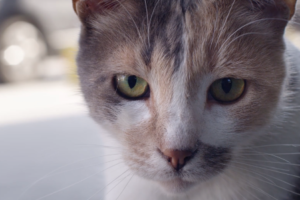 A gorgeous film about the street cats of Istanbul, and the humans who love and care for them.
A gorgeous film about the street cats of Istanbul, and the humans who love and care for them.
Kedi is the Turkish word for cat. It’s also the name of a captivating new film from Turkey by Ceyda Torun about the street cats of Istanbul. There are many thousands of them, not owned as pets for the most part, but living outdoors while being fed by the city’s market owners, restaurant workers, fishermen, shopkeepers, and various other kinds of cat lovers who tell us about the lives and personalities of the prominent cats in their neighborhoods. Thus the film profiles not only this unique feline population, but a human subculture, and ultimately the spirit of the city itself.
One of the first things you’ll notice in Kedi is the camerawork—Torun uses a ground-level steadicam to follow cats on their daily journeys, giving you the impression of a street cat’s perspective, and this opportunity of viewing life from that down to earth point of view is fascinating and alluring.
We get to know several cats intimately during the course of the film, and the people who care for them. There is a beautiful orange momma cat who forages among the diners at outside cafes for food which she takes back to her kittens, safely hidden in a nearby stairwell. Another one earns his keep by hunting mice all night on the fisherman’s wharf. One of the funniest cats is a fierce defender of territory that one observer calls the neighborhood psychopath. She brooks no nonsense from anyone, including her mate, who meekly waits while she finishes eating and gets punished if he fraternizes with other females. Some of the cats like to be petted, others can do without. Each one has a distinct personality.
Their human friends and caretakers appreciate traits that can be surprising at first—most of all their independence, stubbornness, and determination to get what they want at all cost. Rather than being annoyed by these characteristics, the people seem to be inspired and encouraged by them. They don’t want to control the cats, but glory instead in witnessing their freedom, which we get to observe up close through Torun’s marvelous camera technique.
As the film proceeds, a spiritual dimension reveals itself. One man who had an extraordinary stroke of luck because of a cat now feeds a litter hiding in a junkyard. Another man whose difficulties led to chronic depression goes through the neighborhood feeding dozens of cats once a day, explaining that the cats have helped him regain purpose and faith. The people explain, each in different ways, how their relationship to these animals nurtures their souls with love, humor, and gentleness.
The only cloud on the horizon of the film is the continued development and expansion of office buildings in Istanbul, cutting into the seaside and market sections of the old city, and threatening the precious web of human-cat habitat which lends such character to the neighborhoods. One woman whose shop is threatened with being torn down says she worries more about what will happen to the cats than for herself.
Well, if you don’t like cats, maybe you should stay away from this movie. Otherwise, for everyone else, Kedi is an experience you don’t want to miss.

